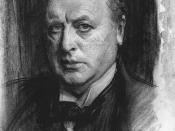Henry James strongly believed in the power of the imagination; he once said, "â¦so long as the events are veiled, the imagination will run riot and depict all sorts of horrors, but as soon as the veil is lifted, all mystery disappears" ("Henry James"). In his novella, "The Beast in the Jungle," James employs characterization through dialogue to explain that imagining and anticipating one's own mysterious fate will cause one's downfall.
In the story, "John Marcher believes he is destined for something enormous, not necessarily good or bad" (Bloom 30). He absorbs himself in anticipating his future so much that he forgets social manners and practical living. Marcher meets May Bartram, but forgets that they meet ten years ago, "signifying his inability to concentrate on anything but himself" (31). Marcher perceives Bartram as confirmation for his superstitions because she acknowledges the fact that he reveals to her that he waits for something rare and strange.
Throughout the story, Marcher and May interact with nobody else; "their lives seem to exist only in relation to the other" (32). This eventually leads to Marcher's tragic downfall.
Their unconventional bond causes Marcher to live life like abnormally. He does not feel romantic passion for May because he is so involved in himself. John views his relationship with May as one of convenience and assurance that he is not alone in his irrational thinking. He needs confirmation from her and views her as if she knows everything, which is evident by the amount of questions he asks her throughout the story. She responds to his curiosity reminiscent of a mother responding to a child - with simplistic and conservative answers. For example:"Do you think me simply out of my mind?" he pursued instead of answering. "Do I merely strike you as a...


